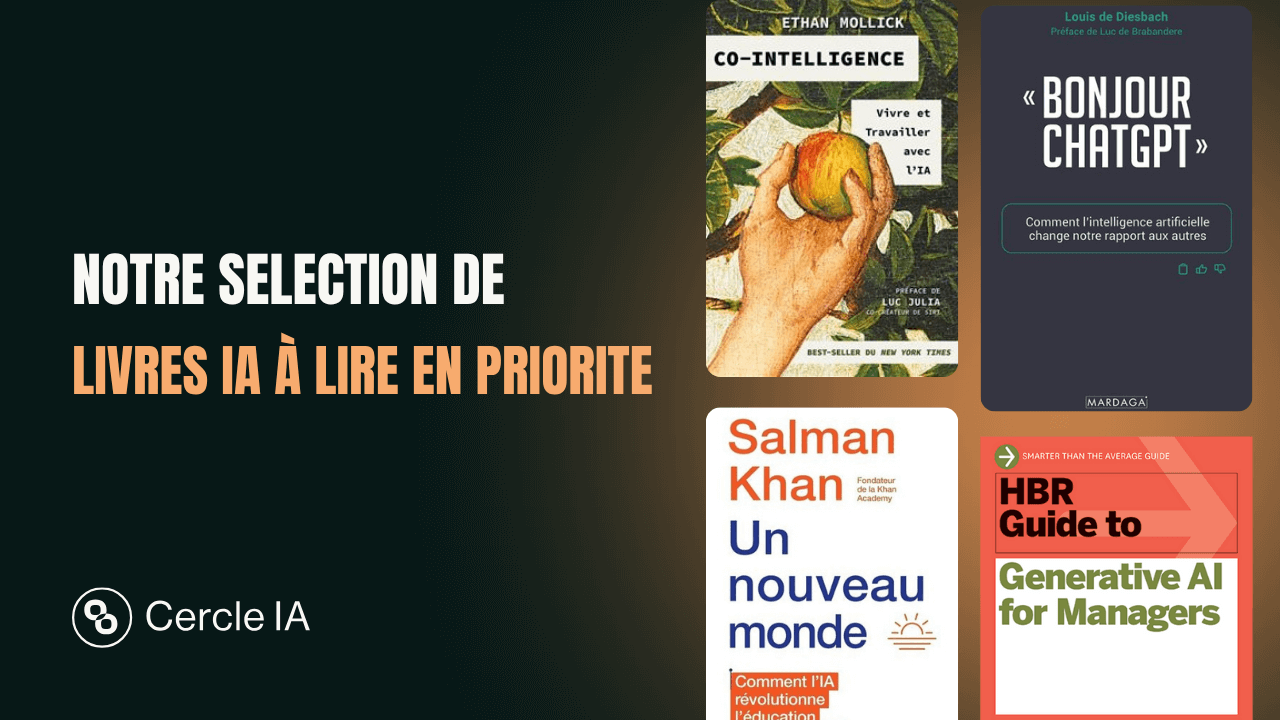Artificial intelligence is everywhere, from search engines and creative tools to strategic business decisions.
If you don’t take the time to understand AI, you run the risk of being subjected to it without ever grasping what’s at stake.
This article presents a selection of 7 essential books to help you better understand AI, its promises and risks, and how to use it in practice.
In this article, you will discover :
- Accessible books, chosen for their clarity and impact
- A wide range of perspectives: technical, philosophical, geopolitical and even fictional
- Keys to understanding AI without unnecessary jargon
Why you need to read AI books now
Every week, a new announcement about artificial intelligence seems to change everything: a revolutionary tool, an ethical debate, a regulatory decision. The press goes wild, networks get excited, opinions fly…
Reading a book on AI is an opportunity to gain perspective. Get out of the flow, structure your understanding, identify the underlying trends behind the daily hustle and bustle.
For decision-makers, consultants, freelancers or managers, this distance is essential, so that you don’t react in haste, but decide consciously and with confidence.
You don’t need to become an engineer. But you do need to know what’s essential: what’s going to last, what’s going to have an impact on your business, what’s going to be transformational (and not just fashionable).
Reading is sorting. And in the age of AI, knowing how to sort is already a first step towards successful adoption.
The aim of this selection is not to surf trends, but to offer high value-added reading for those who have to decide, advise, guide or anticipate.
How these books were selected
Three criteria guided the choice of works:
- Accessible but demanding
These books do not require specific technical skills, but they do demand active reading. They offer an intellectual depth suited to those who need to think clearly in order to act more “justly”. - Complementary angles
Each title sheds light on AI from a different angle: strategy, geopolitics, ethics, economics, fiction or systems criticism. This cross-fertilization enables us to build a broad vision that goes beyond fads and techno-solutionist rhetoric. - A balance between reflection and action
These readings are not there to theorize ad infinitum, but to enable professionals to structure their ideas, adjust their posture and nurture informed decisions.
You won’t (just) find recipes, but keys to better navigation in a world where AI is reshuffling the cards.
AI books to read this summer
Co-intelligence: Living and working with AI by Ethan Mollick
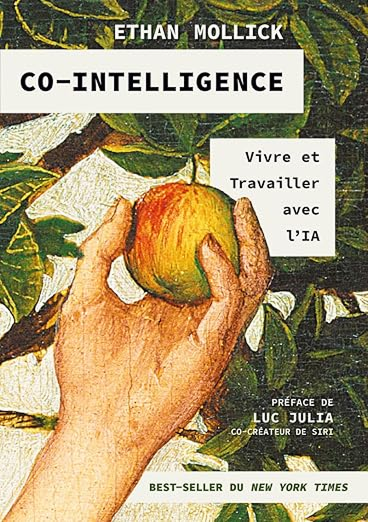
Co-intelligence: Living and Working with AI by Ethan Mollick is a landmark book that explores the growing impact of artificial intelligence (AI) on our lives, ways of working and creative abilities.
Published in April 2024, this book seems almost “old” but remains a classic whose lessons stand up to the rapid evolution of AI.
Ethan Mollick is a Wharton professor and author of the popular newsletter One Useful Thing. In Co-intelligence, he proposes a lucid and pragmatic approach to collaboration between humans and artificial intelligence – a “co-intelligence” that combines the strengths of both worlds.
The author uses concrete examples and practical tools to help everyone adapt effectively to the rise of generative AI tools such as ChatGPT and Gemini.
A practical and strategic handbook: Mollick shares concrete strategies for inviting AI to “his table”, assessing its behavior, understanding its strengths and weaknesses, and working complementarily with it.
He invites the reader to become a “centaur” (where human and AI combine their efforts) and then a “cyborg” (even more integrated collaboration), pointing out that in the future, almost all jobs and processes will be transformed – but rarely totally replaced – by this new co-intelligence.
A new world - How AI is revolutionizing our children's education by Salman Khan
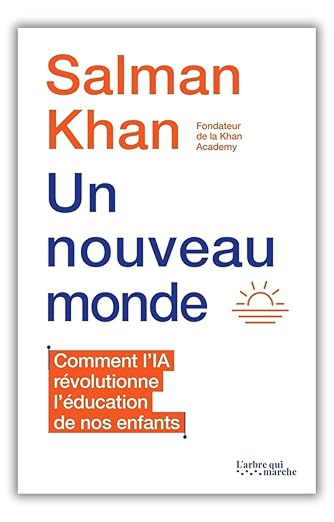
In A New World, Salman Khan, founder of Khan Academy, offers a manifesto for the school of the future, where generative AI is a catalyst for transforming the education of children (as well as their parents). Drawing on his experience as an e-learning pioneer, Khan demonstrates how AI is becoming an essential ally in offering each student tailor-made, inclusive and innovative instruction.
For Salman Khan, generative AI brings 3 key benefits:
- highly personalized learning;
- strengthening inclusion and equity; and
- renewal of the teacher’s role.
HBR Guide to Generative AI for Managers by Elisa Farri and Gabriele Rosani
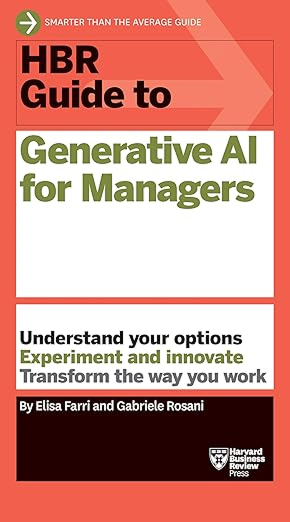
Published by Harvard Business Review Press in early 2025, this practical guide by Elisa Farri and Gabriele Rosani guides managers in all sectors in the practical adoption of generative artificial intelligence (GenAI) for performance, innovation and leadership.
Why read this guide?
- Accelerating the grasp of AI: The book distills practical advice, case studies, ready-to-use prompts and immediately applicable strategies ;
- Covering all key uses for managers: this manual presents 35 managerial tasks (steering, team management, change management, etc.) that can be directly improved using GenAI, with detailed examples.
- Distinguish between two usage logics for generative AI: (i) Co-Pilot: delegate certain tasks or analyses to AI to save time and precision, and (ii) Co-Thinker: dialogue with AI as a thinking partner to make better decisions, stimulate innovation or challenge strategy.
The authors of this handbook are recognized consulting professionals: Elisa Farri (Vice President of Management Lab at Capgemini Invent and member of Thinkers50 Radar 2023) and Gabriele Rosani (Director of Content and Research at Capgemini Invent’s Management Lab).
Bonjour ChatGPT: How artificial intelligence is changing our relationship with others" by Louis de Diesbach
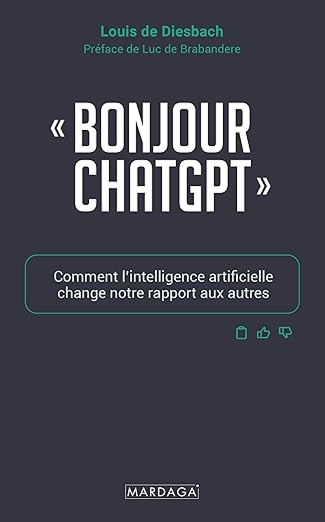
This book offers a reflection on the irruption of artificial intelligence into our daily lives. In just a few weeks, ChatGPT has established itself among over a hundred million users, revolutionizing our relationship with new technologies and, by extension, with each other.
Louis de Diesbach is a consultant, essayist and lecturer on the subjects of artificial intelligence and the ethics of technology. A graduate in philosophy and social sciences, he focuses his work on how new technologies are changing our behavior, our beliefs, and above all our relationship with humans and machines.
In his book “Bonjour ChatGPT: Comment l’intelligence artificielle change notre rapport aux autres” (Hello ChatGPT: How artificial intelligence is changing our relationship with others), he uses a multidisciplinary approach – combining anthropology, history, psychology, ethics and philosophy – to decipher the upheaval caused by the massive arrival of generational artificial intelligence, in particular ChatGPT.
Conclusion: reading and acting in the age of AI
AI is profoundly transforming our societies, our professions and our points of reference at an unprecedented speed.
In this context, taking the time to read books exploring the challenges of artificial intelligence means refusing to get carried away by the ambient noise, so as to better discern the real dynamics at work.
The books presented here don’t pretend to explain everything. But they do offer a vital angle: the ability to think about AI beyond the headlines and slogans, to step back without disconnecting, and above all, to make informed choices (in your profession, in your personal life, in the training of your team and in the education of your children or those around you).
Things to remember :
- These books give us a sense of perspective on the daily media flow.
- They offer a variety of viewpoints, from the most pragmatic to the most philosophical.
- Each offers concrete levers for thinking, acting, or deciding more fairly in the face of AI.
You don’t need to read everything. But starting with one or two of these titles may be enough to transform the way you approach AI
